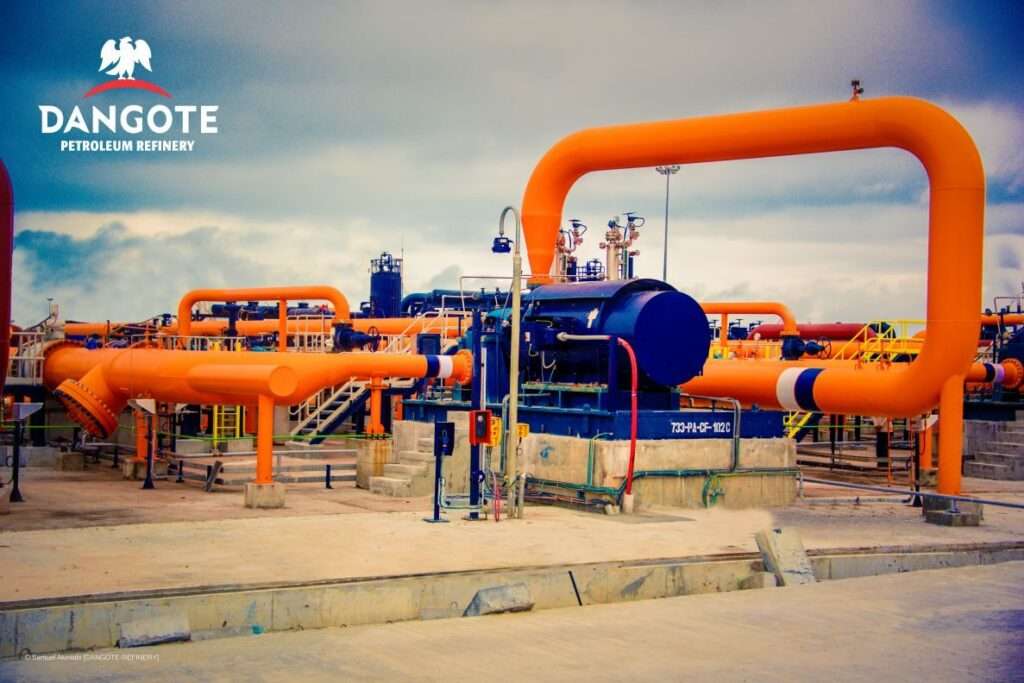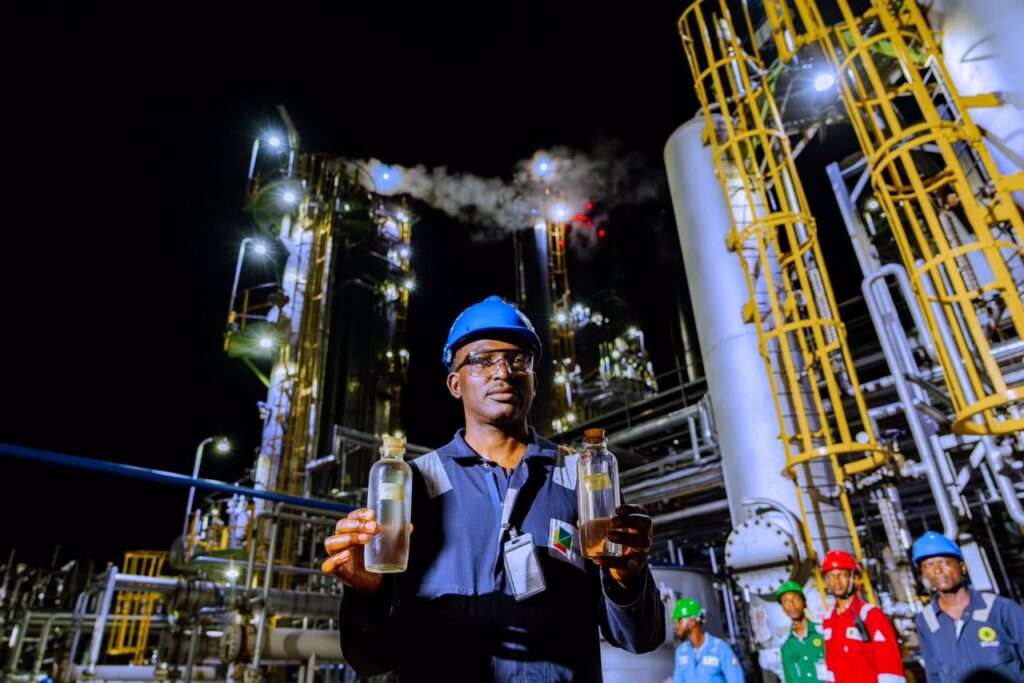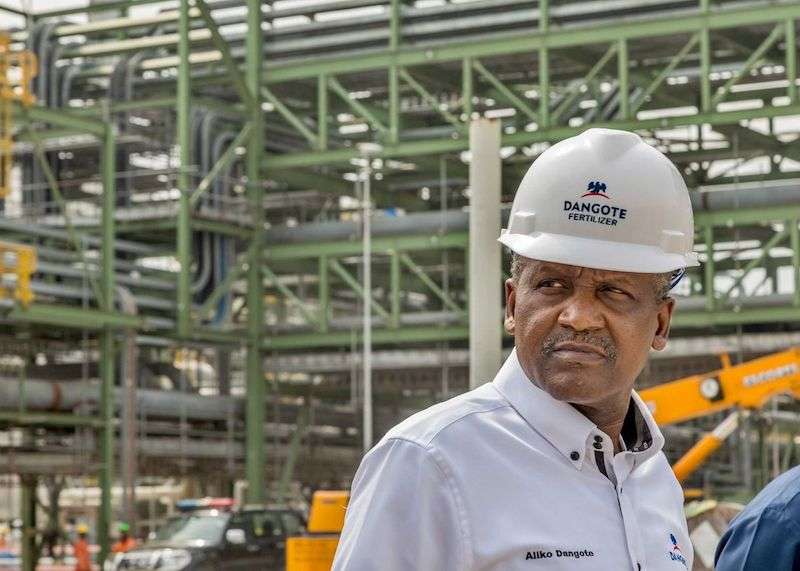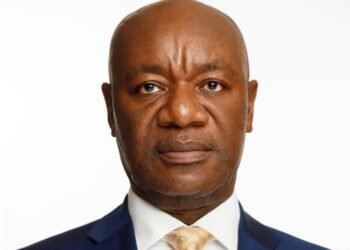Aliko Dangote has reignited debate over Nigeria’s fuel importation policy, urging the federal government to ban the import of refined petroleum products in favour of local production.
Speaking at the Global Commodity Insights Conference in Abuja, the billionaire industrialist framed his appeal within the framework of the “Nigeria First” policy introduced by President Bola Tinubu, calling for the policy’s full application to the petroleum products sector.
Dangote stated that Nigeria’s heavy reliance on imported petrol, diesel, and other refined fuels undermines local refinery investments and national economic development.
He warned that continued fuel imports, often of inferior quality, are hurting domestic refiners, including his own recently operational Dangote Refinery.
According to him, Nigeria is facing what he described as a “dumping” crisis.

“We are now facing increased dumping of cheap, often toxic petroleum products, some of which are blended to substandard levels that would never be allowed in Europe or North America.”
Aliko Dangote
He argued that these low-quality, cut-price imports are destabilising the market, especially as local refiners operate on the basis of full crude oil pricing without the benefit of subsidies or discounts.
He highlighted the disruptive influence of discounted Russian crude oil on African markets, noting that “discounted petroleum products produced in Russia or with discounted Russian crude find their way to Africa, severely undercutting our local production.”
He added that this practice results in retail prices that are inexplicably lower than those in countries like Saudi Arabia, even though Nigeria imports most of its fuel.
Marketers Oppose Import Ban

Dangote’s call is not without controversy. His comments triggered swift backlash from oil marketers and industry groups who accused him of advocating for policies that could foster monopolistic practices.
The Independent Petroleum Marketers Association of Nigeria (IPMAN) and the Petroleum Products Retail Outlet Owners Association of Nigeria (PETROAN) voiced strong opposition to any potential import ban.
Chinedu Ukadike, IPMAN’s National Publicity Secretary, expressed concern that such a policy would eliminate competition and allow one refinery to dominate fuel supply and pricing.
“If the government does that, that means we will not be able to check inflation and monopoly.”
Chinedu Ukadike, IPMAN’s National Publicity Secretary
Ukadike rejected the claim that importation undermines local refineries, arguing instead that it encourages competitiveness and efficiency within the sector.
Echoing these sentiments, PETROAN President Billy Gillis-Harry said that banning imports would be incompatible with the principles of a free economy.
He emphasized the need for multiple sources of fuel supply to avoid the risks of dependency on a single player.
“There’s no reason why any one company should have an overarching value on the entire industry.”
Chinedu Ukadike, IPMAN’s National Publicity Secretary

He also pointed out that while imports of items like toothpicks or traditional foods may warrant restriction, fuel remains a strategic commodity that should be available from as many sources as possible to ensure national energy security.
Despite the resistance, Dangote remains adamant that his refinery is well-positioned to supply Nigeria’s fuel demand.
He revealed that since the start of June, the refinery has already exported one million tonnes of premium motor spirit (PMS), signalling the facility’s capacity to meet both domestic and regional demand.
He noted, “Today, Nigeria has actually become a net exporter of refined products,” during his presentation, underscoring what he views as a new phase in Nigeria’s energy independence.
Dangote also used the occasion to address criticisms over potential market dominance.
“The reality is that too many people who have the means and the opportunity to contribute meaningfully to our nation’s growth choose instead to criticise from the sidelines while investing their wealth abroad.”
Aliko Dangote

The billionaire has recently stepped down as Chairman of Dangote Cement to concentrate on operations at the refinery, petrochemical, and fertiliser arms of his business empire.
As part of efforts to consolidate the refinery’s role in the national fuel supply chain, Dangote Industries is launching a direct fuel delivery scheme starting August 1.
The programme will use 4,000 compressed natural gas (CNG)-powered trucks to transport petrol, diesel, and aviation fuel directly to filling stations and bulk buyers, including telecom operators and industrial firms.
The refinery’s output is also set to increase from 650,000 barrels per day to 700,000 by December, according to Dangote.
While the policy direction of the federal government remains unclear, the clash between one of Africa’s most influential businessmen and key players in Nigeria’s downstream oil sector signals a major debate ahead.
At its core, the issue pits industrial nationalism against market liberalisation—two competing visions for how Nigeria should shape the future of its critical energy sector.
READ ALSO: IMF Urges BoG to Hold Tight on Policy Rate to Cement Disinflation Gains



















